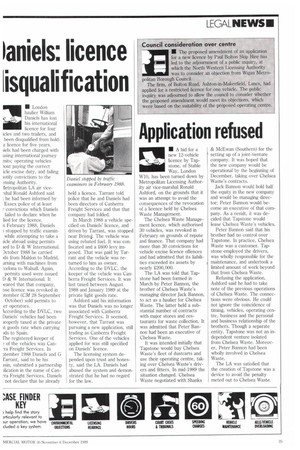Application refused
Page 27

If you've noticed an error in this article please click here to report it so we can fix it.
IN A bid for a new 12-vehicle licence by Tapstone, of Stable Way, London W10, has been turned down by Metropolitan Licensing Authority air vice-marshal Ronald Ashford, on the grounds that it was an attempt to avoid the consequences of the revocation of a licence held by Chelsea Waste Management.
The Chelsea Waste Management licence, which authorised 30 vehicles, was revoked in February on grounds of repute and finance. That company had more than 30 convictions for vehicle excise licence offences and had admitted that its liabilities exceeded its assets by nearly £200,000.
The LA was told that Tapstone had been formed in March by Peter Bannon, the brother of Chelsea Waste's managing director Jack Bannon, to act as a haulier for Chelsea Waste. The latter held a substantial number of contracts with major stores and restaurants for waste collection. It was admitted that Peter Bannon had been an executive of Chelsea Waste.
It was intended initially that Tapstone would buy Chelsea Waste's fleet of dustcarts and use their operating centre, taking over Chelsea Waste's drivers and fitters. In mid-1989 the situation changed. Chelsea Waste negotiated with Shanks & McEwan (Southern) for the setting up of a joint-venture company. It was hoped that the new company would be operational by the beginning of December, taking over Chelsea Waste's contracts.
Jack Bannon would hold half the equity in the new company and would be managing director; Peter Bannon would become an executive of that company. As a result, it was decided that Tapstone would lease Chelsea Waste's vehicles.
Peter Bannon said that his brother had no control over Tapstone. In practice, Chelsea Waste was a customer. Tapstone employed the drivers, was wholly responsible for the maintenance, and undertook a limited amount of work beyond that from Chelsea Waste.
Refusing the application, Ashford said he had to take note of the previous operations of Chelsea Waste. The connections were obvious. He could not ignore the coincidence of timing, vehicles, operating centre, business and the personal and business relationship of the brothers. Though a separate entity, Tapstone was not an independent venture isolated from Chelsea Waste. Moreover, Peter Bannon had been wholly involved in Chelsea Waste.
The LA was satisfied that the creation of Tapstone was a device to avoid the penalty meted out to Chelsea Waste.
















































































































